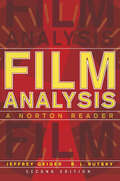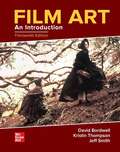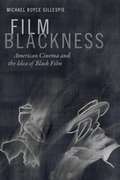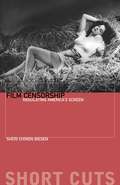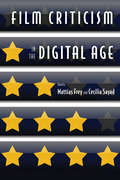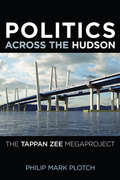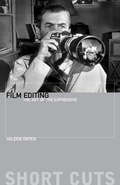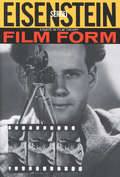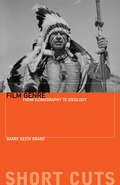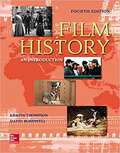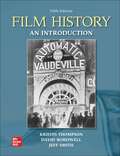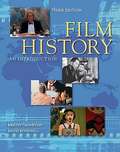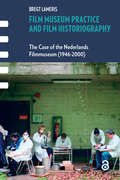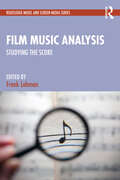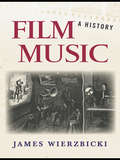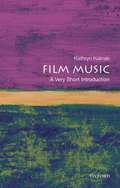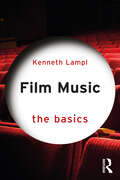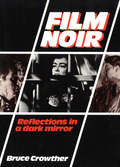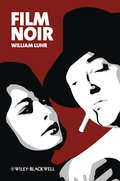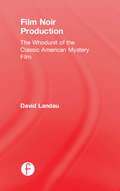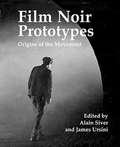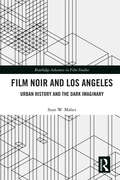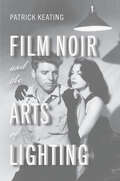- Table View
- List View
Film Analysis: A Norton Reader (Second Edition)
by Jeffrey Geiger R. L. RutskyFifty essays on fifty films—by a who’s-who of film studies. Film Analysis offers concise analyses of fifty diverse and historically significant films—each written exclusively for the text by a leading scholar. Written with the undergraduate in mind, the essays are clear, readable, and great models for students to follow in helping them to hone their own writing. The Second Edition includes six new essays, a new, detailed guide to writing film analysis, and an extensive, up-to-date glossary of critical film terms. This purchase offers access to the digital ebook only.
Film Art: An Introduction
by Jeff Smith David Bordwell Kristin ThompsonFilm is an art form with a language and an aesthetic all its own. Since 1979, Film Art has been the best-selling and most widely respected introduction to the analysis of cinema. Taking a skills-centered approach supported by examples from many periods and countries, the authors help students develop a core set of analytical skills that will enrich their understanding of any film, in any genre. In-depth examples deepen students' appreciation for how creative choices by filmmakers affect what viewers experience and how they respond. Film Art is generously illustrated with more than 1,000 frame enlargements taken directly from completed films, providing concrete illustrations of key concepts. Its Connect program includes invaluable tutorials featuring canonic film clips from the Criterion Collection. The thirteenth edition of Film Art includes extensively updated examples, and expanded coverage of digital filmmaking and the artistic and commercial implications of streaming.
Film Blackness: American Cinema and the Idea of Black Film
by Michael Boyce GillespieIn Film Blackness Michael Boyce Gillespie shifts the ways we think about black film, treating it not as a category, a genre, or strictly a representation of the black experience but as a visual negotiation between film as art and the discursivity of race. Gillespie challenges expectations that black film can or should represent the reality of black life or provide answers to social problems. Instead, he frames black film alongside literature, music, art, photography, and new media, treating it as an interdisciplinary form that enacts black visual and expressive culture. Gillespie discusses the racial grotesque in Ralph Bakshi's Coonskin (1975), black performativity in Wendell B. Harris Jr.'s Chameleon Street (1989), blackness and noir in Bill Duke's Deep Cover (1992), and how place and desire impact blackness in Barry Jenkins's Medicine for Melancholy (2008). Considering how each film represents a distinct conception of the relationship between race and cinema, Gillespie recasts the idea of black film and poses new paradigms for genre, narrative, aesthetics, historiography, and intertextuality.
Film Censorship: Regulating America's Screen (Short Cuts)
by Sheri Chinen BiesenFilm Censorship is a concise overview of Hollywood censorship and efforts to regulate American films. It provides a lean introductory survey of U.S. cinema censorship from the pre-Code years and classic studio system Golden Age—in which film censorship thrived—to contemporary Hollywood. From the earliest days of cinema, movies faced controversy over screen images and threats of censorship. This volume draws extensively on primary research from motion picture archives to unveil the fascinating behind-the-scenes history of cinema censorship and explore how Hollywood responded to censorial constraints on screen content in a changing American cultural and industrial landscape.This primer on American film censorship considers the historical evolution of motion-picture censorship in the United States spanning the Jazz Age Prohibition era, lobbying by religious groups against Hollywood, industry self-censorship for the Hays Office, federal propaganda efforts during wartime, easing of regulation in the 1950s and 1960s, the MPAA ratings system, and the legacy of censorship in later years. Case studies include The Outlaw, The Postman Always Rings Twice, Scarface, Double Indemnity, Psycho, Bonnie and Clyde, Midnight Cowboy, and The Exorcist, among many others.
Film Comedy and the American Dream (Routledge Advances in Film Studies)
by Zach SandsFilm Comedy and the American Dream is an examination of national identity in the era of the American superpower as projected in popular comedic films that center on issues of upward mobility. It is the story of what made audiences laugh and why, and what this says about the changing shape of the American Dream from the end of the Second World War through the first part of the twenty-first century. Through a combination of narrative and thematic analyses of popular comedic films, contextualized within a dynamic historical framework, the book traces the increasing disillusionment with this central ideology in the face of multiple forms of systemic exclusion. It argues that film comedy is a major component of the discourse surrounding the American Dream because these movies often evoke humor by highlighting the incongruities that exist between the ideals that define this nation versus the actual lived experiences of its citizens.
Film Criticism in the Digital Age
by Greg Taylor Maria San Filippo Noah Tsika Nick James Mattias Frey Cecilia Sayad Giacomo Manzoli Daniel Mcneil Outi Hakola Anne Hurault-Paupe Thomas Elsaesser Paolo Noto Armond White Jasmina KallayOver the past decade, as digital media has expanded and print outlets have declined, pundits have bemoaned a "crisis of criticism" and mourned the "death of the critic." Now that well-paying jobs in film criticism have largely evaporated, while blogs, message boards, and social media have given new meaning to the saying that "everyone's a critic," urgent questions have emerged about the status and purpose of film criticism in the twenty-first century. In Film Criticism in the Digital Age, ten scholars from across the globe come together to consider whether we are witnessing the extinction of serious film criticism or seeing the start of its rebirth in a new form. Drawing from a wide variety of case studies and methodological perspectives, the book's contributors find many signs of the film critic's declining clout, but they also locate surprising examples of how critics--whether moonlighting bloggers or salaried writers--have been able to intervene in current popular discourse about arts and culture. In addition to collecting a plethora of scholarly perspectives, Film Criticism in the Digital Age includes statements from key bloggers and print critics, like Armond White and Nick James. Neither an uncritical celebration of digital culture nor a jeremiad against it, this anthology offers a comprehensive look at the challenges and possibilities that the Internet brings to the evaluation, promotion, and explanation of artistic works.
Film Criticism in the Digital Age
by Mattias Frey Cecilia SayadOver the past decade, as digital media has expanded and print outlets have declined, pundits have bemoaned a "crisis of criticism" and mourned the "death of the critic. " Now that well-paying jobs in film criticism have largely evaporated, while blogs, message boards, and social media have given new meaning to the saying that "everyone's a critic," urgent questions have emerged about the status and purpose of film criticism in the twenty-first century. In Film Criticism in the Digital Age, ten scholars from across the globe come together to consider whether we are witnessing the extinction of serious film criticism or seeing the start of its rebirth in a new form. Drawing from a wide variety of case studies and methodological perspectives, the book's contributors find many signs of the film critic's declining clout, but they also locate surprising examples of how critics--whether moonlighting bloggers or salaried writers--have been able to intervene in current popular discourse about arts and culture. In addition to collecting a plethora of scholarly perspectives, Film Criticism in the Digital Age includes statements from key bloggers and print critics, like Armond White and Nick James. Neither an uncritical celebration of digital culture nor a jeremiad against it, this anthology offers a comprehensive look at the challenges and possibilities that the Internet brings to the evaluation, promotion, and explanation of artistic works.
Film Dialogue
by Ed. Jeff JaeckleFilm Dialogue is the first anthology in film studies devoted to the topic of language in cinema, bringing together leading and emerging scholars to discuss the aesthetic, narrative, and ideological dimensions of film speech that have largely gone unappreciated and unheard. Consisting of thirteen essays divided into three sections: genre, auteur theory, and cultural representation, Film Dialogue revisits and reconfigures several of the most established topics in film studies in an effort to persuade readers that "spectators" are more accurately described as "audiences," that the gaze has its equal in eavesdropping, and that images are best understood and appreciated through their interactions with words. Including an introduction that outlines a methodology of film dialogue study and adopting an accessible prose style throughout, Film Dialogue is a welcome addition to ongoing debates about the place, value, and purpose of language in cinema.
Film Editing: The Art of the Expressive (Short Cuts)
by Valerie OrpenFilm Editing provides an introduction to the craft of editing in the non-silent film. In clear and accessible language, Valerie Orpen considers editing as an expressive strategy rather than a mere technique. She reveals that editing can be approached and studied in a similar way to other aspects of film. Traditionally, studies on editing or montage tend to focus on silent cinema, yet this book claims that an examination of editing should also consider the role of the soundtrack. The aim of Film Editing is to examine the way in which editing can make meaning. The book addresses editing as part of a wider context and as a crucial element of the overarching design and vision of a film. Consequently, this book incorporates other parameters, such as mise-en-scène, framing, sound, genre, history, and performance. By examining a number of mainstream and art films, such as Godard's A bout de souffle, Hitchcock's Rear Window, and Scorsese's Raging Bull, Film Editing seeks to dispel the notion that editing is necessarily polarized as continuity versus discontinuity.
Film Form: Essays in Film Theory
by Sergei EisensteinA classic on the aesthetics of filmmaking from the pioneering Soviet director who made Battleship Potemkin. Though he completed only a half-dozen films, Sergei Eisenstein remains one of the great names in filmmaking, and is also renowned for his theory and analysis of the medium. Film Form collects twelve essays, written between 1928 and 1945, that demonstrate key points in the development of Eisenstein&’s film theory and in particular his analysis of the sound-film medium. Edited, translated, and with an introduction by Jay Leyda, this volume allows modern-day film students and fans to gain insights from the man who produced classics such as Alexander Nevsky and Ivan the Terrible and created the renowned &“Odessa Steps&” sequence.
Film Genre: From Iconography to Ideology (Short Cuts)
by Barry Keith GrantThis is a concise evaluation of film genre, discussing genre theory and sample analyses of the western, science fiction, the musical, horror, comedy, and the thriller. It introduces the topic in an accessible way and includes sections on the principles of studying and understanding "the idea of genre"; genre and popular culture; the narrative and stylistic conventions of specific genres; the relations of genres to culture and history, race, gender, sexuality, class and national identity; and the complex relations between genre and authorship. Case studies include: 42nd Street, Pennies from Heaven, Red River, All That Heaven Allows, Night of the Living Dead, Die Hard, Little Big Man, Blue Steel, and Posse.
Film History: An Introduction
by Aron Thompson BordwellWritten by two of the leading scholars in film studies, Film History: An Introduction 4e is a comprehensive, global survey of the medium that covers the development of every genre in film, from drama and comedy to documentary and experimental. Concepts and events are illustrated with frame enlargements taken from the original sources, giving students more realistic points of reference.
Film History: An Introduction
by Jeff Smith David Bordwell Kristin ThompsonThis new edition of Film History has been revised to include recent films, new examples, and updated comprehensive overviews of the rise of streaming services as purveyors of cinematic content as well as the massive disruptions of film production, distribution, and exhibition caused by the COVID-19 pandemic. It is a comprehensive global survey of film and its many genres – from drama and comedy to documentary and experimental – written by three of the discipline’s leading scholars. Concepts and events are illustrated with frame enlargements taken from the original sources, giving students more realistic and relevant points of reference than publicity stills. There are 100 new film clips with commentary in McGraw Hill Connect® – the web-based assignment and assessment platform that helps you connect your students to their coursework. Film History is a text that any serious film scholar – professor, undergraduate, or graduate student – will want to read and keep.
Film History: An Introduction, 3rd Edition
by David Bordwell Kristin ThompsonWritten by two of the leading scholars in film studies, Film History: An Introduction is a comprehensive, global survey of the medium that covers the development of every genre in film, from drama and comedy to documentary and experimental. As with the authors' bestselling Film Art: An Introduction (now in its eighth edition), concepts and events are illustrated with frame enlargements taken from the original sources, giving students more realistic points of reference than competing books that rely on publicity stills. The third edition of Film History is thoroughly updated and includes the first comprehensive overviews of the impact of globalization and digital technology on the cinema. Any serious film scholar--professor, undergraduate, or graduate student--will want to read and keep Film History. Visit the author's blog at http://www. davidbordwell. net/blog/
Film Museum Practice and Film Historiography: The Case of the Nederlands Filmmuseum (1946-2000) (Framing Film)
by Bregt LamerisRich in detail, this is a study of the interrelationships between film historical discourse and archival practices. Exploring the history of several important collections from the EYE Film Museum in Amsterdam, Bregt Lameris shows how archival films and collections always carry the historical traces of selection policies, restoration philosophies, and exhibition strategies. The result is a compelling argument that film archives can never be viewed simply as innocent or neutral sources of film history.
Film Music Analysis: Studying the Score (Routledge Music and Screen Media Series)
by Frank LehmanSince the establishment of film music studies, there has been a steady growth of serious analytical work on the film music repertoire. Film Music Analysis: Studying the Score offers the first collection of essays dedicated to the close investigation of musical structure and meaning in film music. Showcasing scholarship from a diverse and distinguished group of music theorists and musicologists, this book presents the many ways to inspect the inner workings of film music in a manner that is exciting and accessible to anyone curious about this music, regardless of their background in film or music theory.Each chapter takes as its focus one music-theoretical parameter and explores how that concept can be used to analyze and interpret film music. Covering theoretical concepts that range from familiar categories such as leitmotif and pitch structure to more cutting-edge ideas such as timbral associativity, topic theory, and metrical states, the book provides a toolkit with which to explore this captivatingly varied repertoire. With example analyses drawn from classic and contemporary films, Film Music Analysis: Studying the Score is a valuable teaching tool and an indispensable addition to the library of any lover of film and music.
Film Music: A History
by James WierzbickiFilm Music: A History explains the development of film music by considering large-scale aesthetic trends and structural developments alongside socioeconomic, technological, cultural, and philosophical circumstances. The book’s four large parts are given over to Music and the "Silent" Film (1894--1927), Music and the Early Sound Film (1895--1933), Music in the "Classical-Style" Hollywood Film (1933--1960), and Film Music in the Post-Classic Period (1958--2008). Whereas most treatments of the subject are simply chronicles of "great film scores" and their composers, this book offers a genuine history of film music in terms of societal changes and technological and economic developments within the film industry. Instead of celebrating film-music masterpieces, it deals—logically and thoroughly—with the complex ‘machine’ whose smooth running allowed those occasional masterpieces to happen and whose periodic adjustments prompted the large-scale twists and turns in film music’s path.
Film Music: A Very Short Introduction
by Kathryn KalinakFilm music is as old as cinema itself. Years before synchronized sound became the norm, projected moving images were shown to musical accompaniment, whether performed by a lone piano player or a hundred-piece orchestra. Today film music has become its own industry, indispensable to the marketability of movies around the world.
Film Music: The Basics (The Basics)
by Kenneth LamplA comprehensive introduction to film music, this book provides a concise and illuminating summary of the process of film scoring, as well as a succinct overview of the rich history of contemporary film music. Written in a non-technical style, this book begins by presenting a brief history of film music from the last 30 years, covering topics ranging from blockbuster franchises to indie film scores. It explores film music from around the world, including Bollywood and European Avant-garde cinema, and film music in animation, like Disney-Pixar and Japanese anime. It then offers a guide to the language of film music analysis, the creative process behind composing film music, and the use of current technology. The book champions diversity in the industry, with case studies and interviews from a range of active film composers, including: Pinar Toprak (Captain Marvel, 2019), Kris Bowers (Bridgerton, 2020), Natalie Holt (Loki, 2021), and Rachel Portman (Emma, 1996), Complete with a glossary of key terms and further reading, this book is an invaluable resource for all those beginning to study film music, as well as lifelong film music buffs seeking to update their understanding of film music.
Film Noir
by Bruce CrowtherWith the advent of the Second World War a new mood was discernible in film drama - an atmosphere of disillusion and a sense of foreboding, a dark quality that derived as much from the characters depicted as from the cinematographer's art. These films, among them such classics as Double Indemnity, The Woman in the Window, Touch of Evil and sunset Boulevard, emerged retrospectively as a genre in themselves when a French film critic referred to them collectively as film noir.Bruce Crowther looks into noir's literary origins (often in the novels of the so-called 'hard-boiled' school typified by Raymond Chandler, Dashiell Hammett and Cornell Woolrich), and at how the material translated to the screen, noting in particular influences from German expressionist films and the almost indispensable techniques of flashback and voice-over narration. He also assesses the contribution made by the players - by actors such as Robert Mitchum, Dick Powell, Alan Ladd and John Garfield and actresses such as Barbara Stanwyck, Lizabeth Scott, Joan Crawford and Gloria Grahame, together with a roll-call of supporting players whose screen presence could lend almost any film the noir imprimatur.Noir was in its heyday from 1945 to 1955, a time when paranoia and disillusion, anxiety and violence could be said to have been part of the fabric of American, and particularly Hollywood, society, yet its impact and its influence are with us still - in films as diverse as The French Connection, Chinatown and Body Heat. This Book commemorates a special period in film-making and a unique combination of talent resulting in a spectrum of films that are as welcome today on their small-screen airings as they were when first shown in cinema.
Film Noir
by William LuhrFilm Noir offers new perspectives on this highly popular and influential film genre, providing a useful overview of its historical evolution and the many critical debates over its stylistic elements.Brings together a range of perspectives on a topic that has been much discussed but remains notoriously ill-definedTraces the historical development of the genre, usefully exploring the relations between the films of the 1940s and 1950s that established the "noir" universe and the more recent films in which it has been frequently revivedEmploys a clear and intelligent writing style that makes this the perfect introduction to the genreOffers a thorough and engaging analysis of this popular area of film studies for students and scholarsPresents an in-depth analysis of six key films, each exemplifying important trends of film noir: Murder, My Sweet; Out of the Past; Kiss Me Deadly; The Long Goodbye; Chinatown; and Seven
Film Noir Production: The Whodunit of the Classic American Mystery Film
by David LandauDavid Landau’s Film Noir Production: The Whodunit of the Classic American Mystery Film is a book meant for those who like a good story, one the Noir Films always delivered, concentrating on the characters more than anything else. Readers will find in these pages many behind-the-scenes tales of the productions of certain hard-boiled film classics and the prime players involved in their creation, from Darryl Zanuck and Raymond Chandler to John Seitz and Billy Wilder. This book features: A clear understanding of how movies are actually made and all the creative artists that contribute, creating a better appreciation for the many talented artistic collaborators that worked in the Hollywood Studio System and who together created film noir. A behind-the-scenes look at the making of a classic film noir movie that typifies the chapter’s subject, allowing the reader to view that film in a new light and think about it from a new prospective. Appendices of suggested films to screen, film noir books for further reading, and downloadable files containing discussion points and class assignments for each chapter. An informative and conversational writing style, making the subject matter easy to digest and fun to read. This book is an indispensible companion text for anyone studying or interested in film noir, film history, the bygone days of the Hollywood film factories or how movies are actually made.
Film Noir Prototypes: Origins of the Movement
by Alain Silver James UrsiniFilm noir is one of the most enduring and popular genres in cinema. But it did not spring up spontaneously, fully formed. Rather, its origins can be traced to sources as varied as Victorian literature, German Expressionism, and American art and photography. In this comprehensive collection of essays that's packed with illustrations and artwork, a team of eminent scholars and film writers present thorough analyses of the influence of prototypes on the classic period of film noir. Some essays focus on particularly influential genres, such as the rogue cop film and "gothic" thrillers; while others discuss the choices of individual filmmakers, including John Ford and Alfred Hitchcock, in their most well-loved films. The editors and all of the featured contributors Sheri Chinen Biesen, Todd Erickson, Richard Edwards, Julie Grossman, Robert Miklitsch, Homer Pettey, Robert Porfirio, Tom Ryall, Marlisa Santos, Jesse Schlotterbeck, and Tony Williams are noted scholars in the field of film noir, most of whom have written book-length studies of their own. From the gangster and horror genres to social realism and Hitchcock's spy films of the 1930s, Film Noir Prototypes offers compelling accounts of the genre's influences.
Film Noir and Los Angeles: Urban History and the Dark Imaginary (Routledge Advances in Film Studies)
by Sean W. MaherThis book combines film studies with urban theory in a spatial exploration of twentieth century Los Angeles. Configured through the dark lens of noir, the author examines an alternate urban history of Los Angeles forged by the fictional modes of detective fiction, film noir and neo noir. Dark portrayals of the city are analyzed in Raymond Chandler’s crime fiction through to key films like Double Indemnity (1944) and The End of Violence (1997). By employing these fictional elements as the basis for historicising the city’s unrivalled urban form, the analysis demonstrates an innovative approach to urban historiography. Revealing some of the earliest tendencies of postmodern expression in Hollywood cinema, this book will be of great relevance to students and researchers working in the fields of film, literature, cultural and urban studies. It will also be of interest to scholars researching histories of Los Angeles and the American noir imagination.
Film Noir and the Arts of Lighting (Techniques of the Moving Image)
by Patrick KeatingMore than any other set of films from the classical era, the Hollywood film noir is known for its lighting: the cast shadows, the blinking street signs, the eyes sparkling in the darkness. Each effect is rich in symbolism, evoking a world of danger and doppelgangers. But what happens if we set aside the symbolism? This book offers a new account of film noir lighting, grounded in a larger theory of Hollywood cinematography as emotionally engaging storytelling. Above all, noir lighting is dynamic, switching from darkness to brightness and back again as characters change, locations shift, and fates unfold. Richly illustrated, Film Noir and the Arts of Lighting features in-depth analyses of eleven classic movies: The Asphalt Jungle, Sorry, Wrong Number, Odds against Tomorrow, The Letter, I Wake Up Screaming, Phantom Lady, Strangers on a Train, Sweet Smell of Success, Gaslight, Secret beyond the Door, and Touch of Evil.
